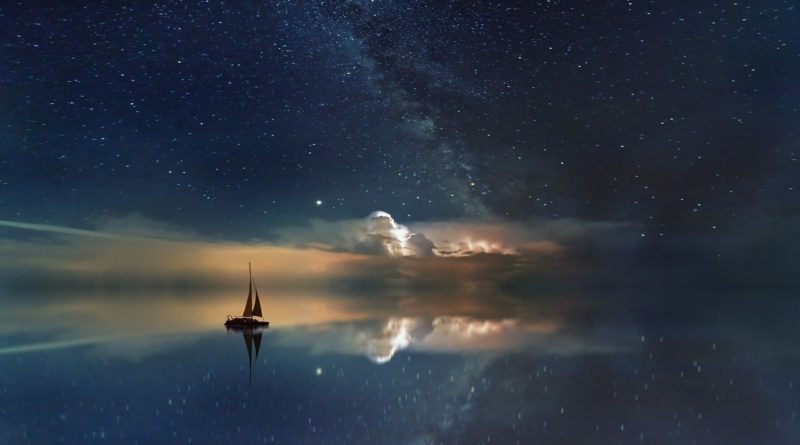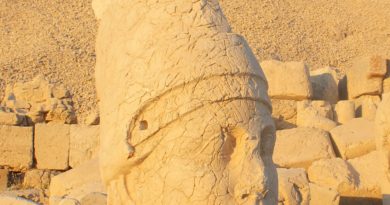The Pourer of Water
By Derek Gilbert
Before God revealed the true nature of the afterlife to us through Jesus and, to a lesser degree, the prophets and apostles, the ancient world had a very different idea about what came after death.
The people who dominated the world during the time of the patriarchs, the Amorites, believed that the quality of life after death depended on one’s children, and their children, and their children, et cetera, until the end of time.
There was more to it than that. The people of the Near East in Abraham’s day never really said goodbye to their ancestors. The dead hung around, always near, as part of everyday life.
In fact, they required the attention of their descendants, and through the rituals of the living, those who’d passed on remained an active part of family, tribe, and community. Life among the Amorites of the second millennium B.C., at least as far as one’s relationships with family and tribe, both living and dead, were very similar to the ancestor veneration found today in many parts of the world.
It may seem odd to Protestants, but the practice is widespread and very old. The earliest written accounts that describe and explain the practice come from the Amorites of the ancient Near East.
Mesopotamians four thousand years ago believed the netherworld was a dark, dreary place. The only food and drink available to the dead was what was provided by one’s descendants. The living were bound by duty to summon the ancestors to a ritual meal called the kispum on the thirtieth day of each month.
This was the night of no moon, the darkest night, when the veil between the world of the living and the land of the dead was apparently thinnest. This is likely why one text in Sumerian and Akkadian from the time of Abraham described the last day of the month as “the evil day,” “dangerous day,” “the day of the kispum,” “day of the disappearance,” and “the day of ‘purification’,” according to Renata MacDougal’s University of Leicester Doctoral dissertation, Remembrance and the Dead in Second Millennium BC Mesopotamia.

This wasn’t like children putting out cookies and milk for Santa Claus on Christmas Eve. The kispum was a necromancy ritual at which the family called the ancestors by name. Failure to perform the rite condemned the ancestors to a gloomy existence of dull, constant hunger.
The monthly kispum rite may have originated with the Amorites. The first written references to it date from the early second millennium B.C., which is when control of Mesopotamia shifted from the Akkadians and Sumerians to the Amorites. The ritual was comprised of three elements: a communal meal, šuma zakāru (“remembering the name”), and mē naqû (“pouring the water”).
Dead ancestors were represented by statues call en-en-ku-ku (“lords who are sleeping”). These statues are probably what the Bible calls teraphim, the household gods stolen by Rachel when Jacob fled from his father-in-law Laban (see Genesis 31).
The food provided to the dead was simple—bread, cold water, hot broth, flour, honey, and maybe some wine or beer flavored with roasted grain. Liquids might be poured into a pipe inserted into the earth, presumably to deliver it directly to the deceased. The provision of water was so important that the family heir who was responsible for the monthly kispum was called a “pourer of water.”
It’s hard for us in the modern world to grasp how crucial these monthly rites were in ancient Mesopotamia. Participation in the afterlife absolutely depended on one’s descendants faithfully fulfilling their duties every New Moon.
This not only nourished the dead through the long years in the netherworld; it kept them pacified. This was important—the dead were dangerous! To guarantee that the heir, usually the eldest son, did right by the expired ancestors, inheritance was tied to the performance of the kispum. Receiving one’s birthright was conditional on performing the monthly rites. Disobedient children might be punished in a will by being barred from accessing the gods and the dead of the recently deceased.
The month of Abu in the Babylonian calendar (the Hebrew month of Ab, or July/August) seems to have been especially important in the annual cycle of the kispum. A letter from Ammi-ditana, the Amorite king of Babylon during the seventeenth century B.C., a contemporary of Jacob and Joseph, calls for milk and butter for the offerings that month. It seems that Abu was believed to be a good time to ask dead relatives to leave the living in peace and to consult them for supernatural advice about how to cope in the world of the living.

Interestingly, the name of the month may derive from a Semitic term ab, meaning “entrance to the netherworld.” In Hebrew, ab means “father,” but in the broader sense of honored ancestors or deities. Many of the gods worshiped in Mesopotamia were called “father,” such as the creator-god of Canaan, El, the “father of mankind,” and the war-god Chemosh, who is described as the father of the Moabites in Numbers 21:29.
This has relevance beyond trying to understand the ancient Mesopotamian monthly meal for the dead, because another word based on ab, the Hebrew abarim (“travelers”), identifies the mountain from which Moses got his only look at the Promised Land and the battleground where the army of the Antichrist will fall.
Ab is also a component of the name “Moab,” where the Israelites camped before crossing the Jordan (and the site of the “mountain of the Abarim,” Mount Nebo). The most common explanation of the etymology of Moab (“from father”) derives from the Bible’s origin story of the nation; the patriarch of the Moabites was a child of incestuous unions between Abraham’s nephew Lot and his daughters, who plied their father with wine when they despaired of having children after losing their fiancés in the destruction of Sodom and Gomorrah.
Likewise, Moab’s northern neighbor, Ammon, was founded by Lot’s other son/grandson, Ben-Ammi, whose name means “son of my people.”
The relationships between the living and the dearly departed were so important that scholars haven’t found any communal cemeteries among Amorite settlements from the Old Testament period—in other words, when the Amorites controlled the lands of the Bible. Families buried their dead under the floors of their homes, maybe so the dead only had to travel about six feet, more or less, to attend the kispum.

This practice is even mentioned in the Bible. Have you ever wondered why the prophet Samuel was buried “in his house at Ramah”? That wasn’t a figure of speech; it was the custom of the time and culture in which Samuel, Saul, David, and Solomon lived.
This dedication of the living to the dead, and the dependence of the dead on the living for their existence after death, is likewise reflected in the story of Abraham. I’ll explain how in next month’s article.

Derek Gilbert hosts SkyWatchTV, a weekly Christian television program, and co-hosts SciFriday, a weekly television program that looks at science news with his wife, author, and analyst Sharon K. Gilbert. His broadcast career spans nearly four decades, with stops in Little Rock, Saint Louis, and Philadelphia, and he’s been interviewing guests for his podcast, A View from the Bunker, since 2009. Derek is author of the groundbreaking books The Great Inception and Last Clash of the Titans. He’s also the co-author with Josh Peck of The Day the Earth Stands Still, which exposes the occult origins of the modern UFO phenomenon. Bad Moon Rising: Islam, Armageddon, and the Most Diabolical Double-Cross in History was released in the summer of 2019. Derek and Sharon recently released Veneration: Unveiling the Ancient Realms of Demonic Kings and Satan’s Battle Plan for Armageddon, about ancient death cults and the Bible. Their newest book, Giants, Gods, and Dragons: Exposing the Fallen Realm and the Plot to Ignite the Final War of the Ages, was released November 30, 2020 and became a #1 “Hot New Release.” His newest book, The Second Coming of Saturn: The Great Conjunction, America’s Temple, and the Return of the Watchers, is available for pre-order and will be released November 15, 2021. Derek is a popular conference speaker, a lifelong fan of the Chicago Cubs, prefers glasses to contacts, and has been known to sing the high part in barbershop and gospel quartets. Find out more: www.derekpgilbert.com, www.gilberthouse.org, www.vftb.net, and www.SkyWatchTV.com.




Always good articles ! Thanks Troy
Great article Derek,
Your own research should tell you one thing, no one believed when they died they went to heaven. They all believed they went to Sheol, the grave aka the underworld. Even David in the Psalms spoke of the hope of one day being delivered from Sheol. Samuel was stirred from Sheol not heaven and Job spoke of going to Sheol not heaven.
Because so many Christians don’t understand this & are confused about what and where heaven is.
Heaven is Gods abode, his throne, the garden a mountain aka paradise the NEW JERUSALEM. When you realize no one has died & gone to heaven but to the realm of the dead awaiting the resurrection of the dead to salvation to then enter the Garden kingdom throne room paradise the New Jerusalem, setting everything back to how it was the Bible begins to make since.
If no one is in heaven, then no one can be raptured to heaven for 7 years that completely destroys that narrative.
People are totally misunderstanding things like my father’s house-it’s the new Jerusalem or I’ve gone to prepare a place for you. Jesus actually says when I come I’ll take you where I am -that’s when he takes us to the New Jerusalem on earth.
Reading all the verses people believe talk about heaven in the sky-don’t actually ever say that, it’s inferred or reading into the text from misunderstood tradition of men.
How I would love to have this conversation with you.
Read Enoch again . It tells you all about the after live until resurrection happens. There appears to be compartments are communities where the unbelievers are, one for believers one for the watchers etc I think there’s 4. There’s no soul sleep, Able is allowed to make suit about his death. But we are not in heaven nor are we around the throne of God. 1 Cor 15 makes it clear that you don’t get your new body until resurrection and without it one cannot enter heaven. Aka the throne! Bottom line, if you died and were with God and got your new body, what would be the point of the resurrection? I mean your safe your in the presence of God… the resurrection would be pointless.
I could go on an on. Once you get this then a rapture is disproven.
Let me help you, I can open your eyes to we are in the last days every sense Jesus died-the tribulation will only increase . I can explain who’s alive, the second death ….
Once you grasp this, dispensation is clearly a total lie from Satan.
Eyes to see-